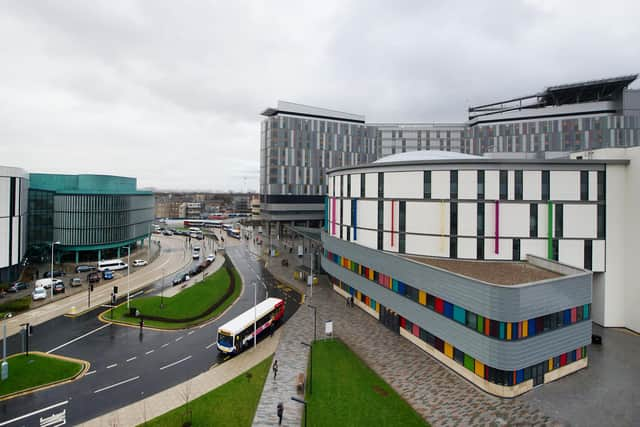Girl tells how life-saving chemotherapy was stopped after she caught infection in Glasgow hospital operating theatre
Stevie-Jo Kirkpatrick, 17, said it led to her developing a green, pus-filled, golf-ball sized sore and suffered painful lumps throughout her body which bled and left scars.
Doctors stopped her maintenance chemotherapy six months early so she could fight off the rare mycobacterium chelonae infection, traced back to the water supply at the operating theatre of the Queen Elizabeth University Hospital (QEUH) in Glasgow.
Advertisement
Hide AdAdvertisement
Hide AdGiving evidence to the Scottish Hospitals Inquiry on Monday, Ms Kirkpatrick said she was moved to Dumfries and Galloway Royal Infirmary as it was felt she would be safer there.


Ms Kirkpatrick said she is “scared” of the Glasgow hospital site and suffers panic attacks because of this.
The inquiry is investigating the QEUH and Royal Children’s Hospital in Glasgow after issues at the new flagship site were linked to the deaths of two children.
It was ordered after patients there died from infections linked to pigeon droppings and the water supply.
Ms Kirkpatrick told the inquiry she acquired the infection following surgical removal of a chemotherapy catheter in February 2019.
She said: “I got an infection so rare that I cannot continue my cancer treatment. I was quite worried and scared.”
First diagnosed with leukaemia in 2014 aged nine, she was initially treated at a children’s cancer ward, the Schiehallion Unit, in the city’s Royal Hospital for Children at its old site at Yorkhill and, following a relapse in 2017, was treated at the new Schiehallion Unit at the QEUH campus.
She said the new site constantly smelled of sewage, making her feel more sick.
Advertisement
Hide AdAdvertisement
Hide AdProblems with the water supply there led to her being asked to use bottled water and being unable to shower, making her feel the water “wasn’t safe”.
Her room was filled with light round the clock and was noisy as it looked on to the main atrium and, asked how much sleep she got, she said: “Nothing.”
Ms Kirkpatrick said that unlike Yorkhill, the young cancer patients were kept in isolation “constantly” so she felt “lonely”, there were no TVs in the rooms and fans needed to cool the “boiling” temperatures were removed.
She said the Yorkhill unit had double doors to “keep it purified” but the new site did not and she was told by a staff member the ventilation was only “30 per cent of what it should be”.
Later, she contracted meningitis and was treated at the site’s adult hospital which she said was a “depressing and lonely experience”.
A nurse told her about people contracting the cryptococcus infection, hearing that pigeons got in the ventilation of the hospital.
“It was a worry how far it would travel and people were getting sick from it,” she said.
“I was worried. I had a really low immune system then, well, I didn’t have one.”
Advertisement
Hide AdAdvertisement
Hide AdShe said patients and staff were “up in arms” about the infections and told the inquiry in written evidence that her specialist, Professor Brenda Gibson, said “the best way to keep me safe from all the infections in the hospital was to transfer me down to Dumfries hospital”.
Her mother, Annemarie Kirkpatrick, also gave evidence.
She said her daughter still suffers with the infection three years on and claimed doctors said it could take up to five years to fight off.
She added: “When you’re faced with something (the infection) that’s very rare and told that the doctors don’t actually know if they can fight the infection, and it’s caused by a hospital that should be safe and there to protect some of the sickest children in Scotland, is horrendous.
“To find out the hospital has inflicted more pain and could have taken our child’s life is devastating.”
Alastair Duncan QC, counsel to the inquiry, asked Ms Kirkpatrick how she felt about her daughter contracting an infection which prevented her from receiving her chemotherapy to which she replied: “I actually can’t put into words how I feel about that.
“I am devastated and angry.”
Ms Kirkpatrick also said part of the roof at the adult hospital “blew off” and windows “fell out” of their frames and she saw sewage bursting through tiles in one of the hospital’s corridors.
In a closing statement, she said: “I don’t feel safe in the hospital, and I know for a fact that my daughter certainly doesn’t feel safe.
“It is not just the infections, I don’t even feel the actual building is safe. I don’t feel that the structure of the building is safe.
Advertisement
Hide AdAdvertisement
Hide Ad“I don’t feel that the health board has got the kids’ best interests, or their care is at the centre of it.”
Earlier this year, an independent review found the deaths of two children at the QEUH campus were at least in part the result of infections linked to the hospital environment.
The inquiry in Edinburgh, chaired by Lord Brodie, continues.
Health boards are due to give their evidence at a later stage.
Comments
Want to join the conversation? Please or to comment on this article.
